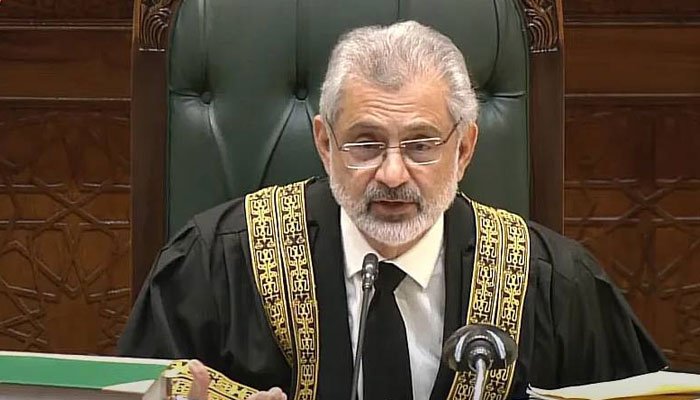Earlier today, the federal government filed an application in the Supreme Court to withdraw its plea against the verdict.
‘Why is everyone so scared?’ CJP Isa. Chief Justice of Pakistan (CJP) Qazi Faez Isa Thursday expressed annoyance after multiple petitioners seeking a review of the Supreme Court’s 2019 verdict against the Faizabad sit-in decided to withdraw their pleas.
“Why everyone is so scared?,” the chief justice remarked, as a three-member bench — comprising Athar Minallah and Justice Aminuddin Khan — heard the review pleas.
Multiple pleas were filed challenging the verdict on the Faizabad sit-in staged by the Tehreek-e-Labbaik Pakistan (TLP) in 2017 against the then Pakistan Muslim League-Nawaz (PML-N) government.
CJP Isa, who was a member of the three-member bench that issued the 2019 verdict, also expressed annoyance over the non-implementation of the years-old order.
The chief justice told the parties seeking to withdraw their pleas — the federal government, Pakistan Electronic Media Regulatory Authority, the Election Commission of Pakistan, and others — to submit their responses in writing and explain the reasons behind their decision.
“I am surprised over the petitioners request to call back their petitions,” the CJP remarked, noting that he wanted to give time to the petitioners as he adjourned the hearing till November 1.
Briefly, before adjourning the hearing, the CJP told the parties that their decision to withdraw their pleas meant that they had accepted the SC’s order to be true. “Now is your chance to stand with the truth.”
Earlier today, the federal government filed an application in the Supreme Court to withdraw its plea against the verdict.
Attorney General for Pakistan (AGP) Mansoor Usman Awan told Geo News that the federal government, which had filed the plea through the Ministry of Defence, has decided to withdraw its petition.
More From FactFile: CJP Isa lauded for inviting wife on stage during oath-taking ceremony
Earlier this week, the Pakistan Electronic Media Regulatory Authority (Pemra) and Intelligence Bureau (IB) also filed similar applications, seeking the withdrawal of their petitions.
Last week, the apex court — in response to a series of review petitions submitted against its previous ruling — said that it would revisit the Faizabad sit-in case on September 28 (today).
The review petitions were filed by the Ministry of Defence, the IB, the PTI, the Pemra, the Election Commission of Pakistan (ECP), the Muttahida Qaumi Movement (MQM), Awami Muslim League chief Sheikh Rasheed Ahmed and Ejazul Haq.
Rasheed’s lawyer had also sought adjournment of today’s hearing saying his client was not in custody and could not be contacted.
Faizabad sit-in legal saga
This legal saga began on April 15, 2019, when the then-federal government, along with entities like the Defence Ministry, Intelligence Bureau, PTI government, AML chief Sheikh Rashid Ahmed, MQM-P, and the Pemra, among others, filed review pleas contesting the apex court’s judgement delivered by the incumbent Chief Justice Qazi Faez Isa regarding the Faizabad sit-in case.
Earlier on February 6, 2019, a two-member bench of the apex court comprising the now-CJP Isa and Justice Mushir Alam recommended that persons, issuing an edict or fatwa to harm another person or put another person in the harm’s way must be dealt with iron hand and prosecuted under relevant laws.
It also ruled that the intelligence agencies must not exceed their respective mandates. Later, the bench disposed of a suo moto case regarding the 2017 Faizabad sit-in staged by the TLP.
The 43-page verdict issued by the two-judge bench and published on the apex court’s website read: “Every citizen and political party has the right to assemble and protest provided such assembly and protest is peaceful and complies with the law imposing reasonable restrictions in the interest of public order.
The right to assemble and protest is circumscribed only to the extent that it infringes on the fundamental rights of others, including their right to free movement and to hold and enjoy property.”
In November 2017, the top court took suo motu notice of the three-week-long sit-in, which was held against a change in the finality-of-Prophethood oath, termed by the government as a clerical error, when the government passed the Elections Act 2017.
The sit-in was called off after the protesters reached an agreement with the government.
























Comments 1